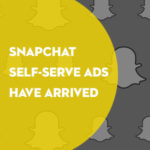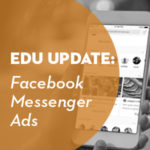Last week, Facebook announced it will be getting rid of its real-time bidding ad exchange – Facebook Exchange or “FBX” – in November 2016. The company launched FBX in June 2012 to allow advertisers to purchase advertisement inventory that retargets users based on online behaviors through Demand-Side Platforms (DSPs) like MediaMath and Criteo.

Many speculate that Facebook is making the move to reduce interaction with third-party systems to guard data and assets from the open marketplace. The shift to mobile ads is also a key factor in the company’s shuttering of FBX. Ads through FBX are only available on desktop (newsfeed or right rail), but the vast majority of ad revenue on Facebook stems from mobile traffic. In Q1, mobile ads accounted for 82 percent of total ad revenue (up from 73 percent last year).
So what does this mean for higher ed? Unless your institution is using a DSP to purchase remarketing inventory programmatically on Facebook, the elimination of FBX this fall won’t cause much disruption. And even if you are, the cessation of FBX will not impose many limitations to your digital strategy. Remarketing capabilities, as well as a vast selection of behavioral targeting, is available to advertisers through Facebook’s self-serve platform (Audience Network). The real takeaway from this announcement is the affirmation of a trend we have seen become more and more prominent over the past few months – the shift to the smart phone.
In March 2016, Facebook estimated about 989 million daily active users (DAUs) on mobile. That is a 24 percent year-over-year increase. With such a monumental shift towards mobile usage on Facebook, institutions need to think about how to adapt and stand out amid all the noise and distractions that saturate a prospect’s smartphone.
Some questions to ask before serving ads to your smart-phone-connected audience:
- Am I using too much copy in my ads? Would my prospects take the time to read all of this?
- Does my image seem native to the mobile platform?
- Is my message and imagery memorable?
- Should I be leveraging all of Facebook’s mobile ad options, including canvas ads, video ads, and Instagram?
- Am I sending prospects to a mobile-optimized landing page or website?
- Once prospects are on my landing page, does my content put them to sleep or spark interest to request more information?
Your prospective students are spending more and more time on their smart phones. How will your institution leave its mark in a hectic mobile space becoming increasingly saturated with content and messaging? Now is the time to find the answer.
Ready to take your strategy to the next level? Learn more about our digital advertising services.







